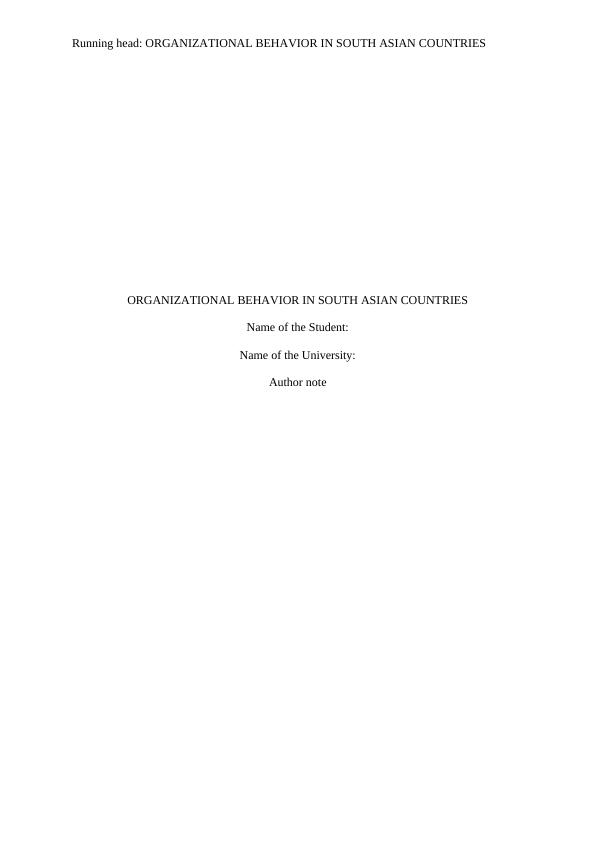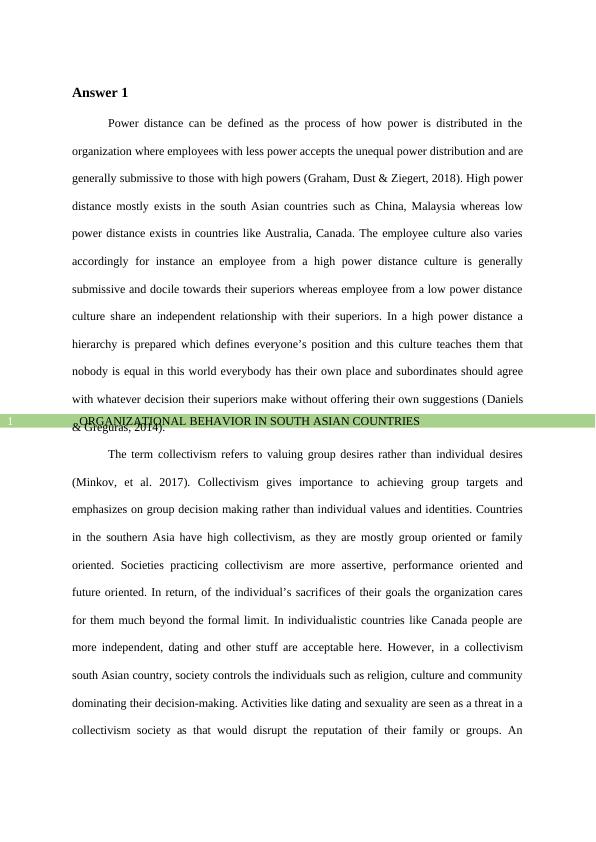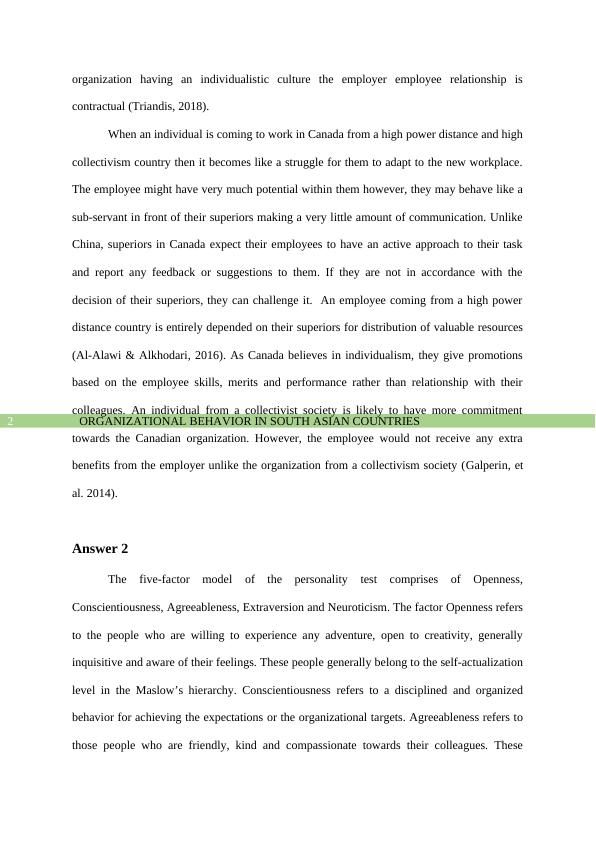ORGANIZATIONAL BEHAVIOR IN SOUTH ASIAN COUNTRIES
Added on 2022-08-20
8 Pages2024 Words11 Views
Running head: ORGANIZATIONAL BEHAVIOR IN SOUTH ASIAN COUNTRIES
ORGANIZATIONAL BEHAVIOR IN SOUTH ASIAN COUNTRIES
Name of the Student:
Name of the University:
Author note
ORGANIZATIONAL BEHAVIOR IN SOUTH ASIAN COUNTRIES
Name of the Student:
Name of the University:
Author note

ORGANIZATIONAL BEHAVIOR IN SOUTH ASIAN COUNTRIES1
Answer 1
Power distance can be defined as the process of how power is distributed in the
organization where employees with less power accepts the unequal power distribution and are
generally submissive to those with high powers (Graham, Dust & Ziegert, 2018). High power
distance mostly exists in the south Asian countries such as China, Malaysia whereas low
power distance exists in countries like Australia, Canada. The employee culture also varies
accordingly for instance an employee from a high power distance culture is generally
submissive and docile towards their superiors whereas employee from a low power distance
culture share an independent relationship with their superiors. In a high power distance a
hierarchy is prepared which defines everyone’s position and this culture teaches them that
nobody is equal in this world everybody has their own place and subordinates should agree
with whatever decision their superiors make without offering their own suggestions (Daniels
& Greguras, 2014).
The term collectivism refers to valuing group desires rather than individual desires
(Minkov, et al. 2017). Collectivism gives importance to achieving group targets and
emphasizes on group decision making rather than individual values and identities. Countries
in the southern Asia have high collectivism, as they are mostly group oriented or family
oriented. Societies practicing collectivism are more assertive, performance oriented and
future oriented. In return, of the individual’s sacrifices of their goals the organization cares
for them much beyond the formal limit. In individualistic countries like Canada people are
more independent, dating and other stuff are acceptable here. However, in a collectivism
south Asian country, society controls the individuals such as religion, culture and community
dominating their decision-making. Activities like dating and sexuality are seen as a threat in a
collectivism society as that would disrupt the reputation of their family or groups. An
Answer 1
Power distance can be defined as the process of how power is distributed in the
organization where employees with less power accepts the unequal power distribution and are
generally submissive to those with high powers (Graham, Dust & Ziegert, 2018). High power
distance mostly exists in the south Asian countries such as China, Malaysia whereas low
power distance exists in countries like Australia, Canada. The employee culture also varies
accordingly for instance an employee from a high power distance culture is generally
submissive and docile towards their superiors whereas employee from a low power distance
culture share an independent relationship with their superiors. In a high power distance a
hierarchy is prepared which defines everyone’s position and this culture teaches them that
nobody is equal in this world everybody has their own place and subordinates should agree
with whatever decision their superiors make without offering their own suggestions (Daniels
& Greguras, 2014).
The term collectivism refers to valuing group desires rather than individual desires
(Minkov, et al. 2017). Collectivism gives importance to achieving group targets and
emphasizes on group decision making rather than individual values and identities. Countries
in the southern Asia have high collectivism, as they are mostly group oriented or family
oriented. Societies practicing collectivism are more assertive, performance oriented and
future oriented. In return, of the individual’s sacrifices of their goals the organization cares
for them much beyond the formal limit. In individualistic countries like Canada people are
more independent, dating and other stuff are acceptable here. However, in a collectivism
south Asian country, society controls the individuals such as religion, culture and community
dominating their decision-making. Activities like dating and sexuality are seen as a threat in a
collectivism society as that would disrupt the reputation of their family or groups. An

ORGANIZATIONAL BEHAVIOR IN SOUTH ASIAN COUNTRIES2
organization having an individualistic culture the employer employee relationship is
contractual (Triandis, 2018).
When an individual is coming to work in Canada from a high power distance and high
collectivism country then it becomes like a struggle for them to adapt to the new workplace.
The employee might have very much potential within them however, they may behave like a
sub-servant in front of their superiors making a very little amount of communication. Unlike
China, superiors in Canada expect their employees to have an active approach to their task
and report any feedback or suggestions to them. If they are not in accordance with the
decision of their superiors, they can challenge it. An employee coming from a high power
distance country is entirely depended on their superiors for distribution of valuable resources
(Al-Alawi & Alkhodari, 2016). As Canada believes in individualism, they give promotions
based on the employee skills, merits and performance rather than relationship with their
colleagues. An individual from a collectivist society is likely to have more commitment
towards the Canadian organization. However, the employee would not receive any extra
benefits from the employer unlike the organization from a collectivism society (Galperin, et
al. 2014).
Answer 2
The five-factor model of the personality test comprises of Openness,
Conscientiousness, Agreeableness, Extraversion and Neuroticism. The factor Openness refers
to the people who are willing to experience any adventure, open to creativity, generally
inquisitive and aware of their feelings. These people generally belong to the self-actualization
level in the Maslow’s hierarchy. Conscientiousness refers to a disciplined and organized
behavior for achieving the expectations or the organizational targets. Agreeableness refers to
those people who are friendly, kind and compassionate towards their colleagues. These
organization having an individualistic culture the employer employee relationship is
contractual (Triandis, 2018).
When an individual is coming to work in Canada from a high power distance and high
collectivism country then it becomes like a struggle for them to adapt to the new workplace.
The employee might have very much potential within them however, they may behave like a
sub-servant in front of their superiors making a very little amount of communication. Unlike
China, superiors in Canada expect their employees to have an active approach to their task
and report any feedback or suggestions to them. If they are not in accordance with the
decision of their superiors, they can challenge it. An employee coming from a high power
distance country is entirely depended on their superiors for distribution of valuable resources
(Al-Alawi & Alkhodari, 2016). As Canada believes in individualism, they give promotions
based on the employee skills, merits and performance rather than relationship with their
colleagues. An individual from a collectivist society is likely to have more commitment
towards the Canadian organization. However, the employee would not receive any extra
benefits from the employer unlike the organization from a collectivism society (Galperin, et
al. 2014).
Answer 2
The five-factor model of the personality test comprises of Openness,
Conscientiousness, Agreeableness, Extraversion and Neuroticism. The factor Openness refers
to the people who are willing to experience any adventure, open to creativity, generally
inquisitive and aware of their feelings. These people generally belong to the self-actualization
level in the Maslow’s hierarchy. Conscientiousness refers to a disciplined and organized
behavior for achieving the expectations or the organizational targets. Agreeableness refers to
those people who are friendly, kind and compassionate towards their colleagues. These

End of preview
Want to access all the pages? Upload your documents or become a member.
Related Documents
Hofstede’s Cultural Dimesnion and Five Bases of Powerlg...
|9
|2950
|83
Assignment - Cultural Diversitylg...
|9
|2256
|51
Hofetede's Cultural Dimensions Assignmentlg...
|6
|1270
|54
Study Skills for Higher Educationlg...
|12
|2710
|66
Analysis of Global Leadership Competencieslg...
|9
|2103
|144
Hofstede Cultural Dimension : Essaylg...
|6
|1287
|454
